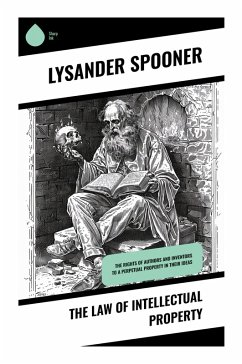In "The Law of Intellectual Property," Lysander Spooner presents a foundational critique of intellectual property rights, challenging prevailing notions of ownership and creativity. Written in the 19th century, Spooner's work employs a rigorous analytical framework akin to legal philosophy, utilizing deductive reasoning to question the moral and economic implications of intellectual property laws. His literary style is marked by clarity and precision, effectively engaging with contemporary legal thought while delineating the inherent conflicts between individual rights and governmental regulation. Spooner's arguments resonate within the broader context of libertarian principles, advocating for personal autonomy and free market dynamics in the realm of ideas. Lysander Spooner was a prominent American legal theorist, abolitionist, and political activist known for his radical views on law and governance. His experiences as a lawyer during a time of growing governmental control over individual rights likely informed his skepticism towards intellectual property as an infringement on personal liberties. Spooner's ability to synthesize legal theory with a passionate advocacy for personal freedom shaped his distinct perspective on ownership rights, influencing generations of thinkers and activists. "The Law of Intellectual Property" is a must-read for anyone interested in the intersections of law, economics, and philosophy. Spooner's incisive critique fosters a greater understanding of the implications of intellectual property laws, encouraging readers to question established norms and consider the ethical ramifications of ownership in the age of information. This work is indispensable for scholars, legal practitioners, and anyone passionate about the rights of individuals versus the state.
Bitte wählen Sie Ihr Anliegen aus.
Rechnungen
Retourenschein anfordern
Bestellstatus
Storno








